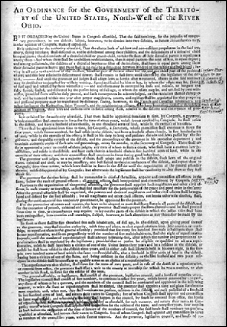Why not a statute?
So reader John D. of Louisiana tossed an email to The Legal Genealogist yesterday after reading about the creation of land offices in the Northwest Territory and the requirement that federal officials involved in those land offices be bonded.
 “That’s something that’s always puzzled me,” he said. “The law creating the Northwest Territory is always called the Northwest Ordinance. Why that? Why not, say, Northwest Statute? Or Northwest Law?”
“That’s something that’s always puzzled me,” he said. “The law creating the Northwest Territory is always called the Northwest Ordinance. Why that? Why not, say, Northwest Statute? Or Northwest Law?”
Ooooh. Good question.
Particularly since the way the word ordinance was used at the time is so very different from what we think of today when we use the word.
Modern usage of the word ordinance generally focuses on the most local levels of government: a village, a town, a city. So you’ll find the word defined as a “law adopted by a town or city council, county board of supervisors, or other municipal governing board”1 or “a law passed by a municipal government.”2
Even fairly early legal dictionaries focused on this local meaning. The 1856 version of Bouvier’s Law Dictionary notes that the “word is more usually applied to the laws of a corporation, than to the acts of the legislature; as the ordinances of the city of Philadelphia.”3 The 1891 first edition of Black’s Law Dictionary says the same: “In a more limited sense, the term is used to designate the enactments of the legislative body of a municipal corporation.”4
And, of course, that’s not at all the way the second Continental Congress was using the term when it adopted the Northwest Ordinance on 13 July 1787.5
No, the Northwest Ordinance did a lot more than just set local law:
(It) chartered a government for the Northwest Territory, provided a method for admitting new states to the Union from the territory, and listed a bill of rights guaranteed in the territory. Following the principles outlined by Thomas Jefferson in the Ordinance of 1784, the authors of the Northwest Ordinance (probably Nathan Dane and Rufus King) spelled out a plan that was subsequently used as the country expanded to the Pacific.6
And the answer doesn’t seem to come from the English common law, since it was used there to distinguish a legislative action that only needed two of three lawmaking elements (monarch, lords, and commons) to become law whereas a statute needed all three.7 We didn’t have any similar distinction in early American common law; we still don’t have it now.
So the answer appears to come from the distinction Black explains at the end of his dictionary definition:
The name has also been given to certain enactments, more general in their character than ordinary statutes, and serving as organic laws, yet not exactly to be called “constitutions.” Such was the “Ordinance for the government of the North-West Territory,” enacted by congress in 1787.8
So… the lawmakers needed a word to describe something bigger, more general, more broadly applicable than a simple statute would be, but smaller, less encompassing, than a constitution would be. And since the document itself begins with the words “Be it ordained,” well, what better word for what was ordained than an ordinance?
In other words, Congress made it up.
Somehow, that just doesn’t surprise me.
SOURCES
- Wex, Legal Information Institute, Cornell Law School (http://www.law.cornell.edu/wex : accessed 17 Dec 2014), “ordinance.” ↩
- The Free Dictionary (http://www.thefreedictionary.com : accessed 17 Dec 2014), “ordinance.” ↩
- John Bouvier, A Law Dictionary Adapted to the Constitution and Laws of the United States of America and of the Several States of the American Union, rev. 6th ed. (1856); HTML reprint, The Constitution Society (http://www.constitution.org/bouv/bouvier.htm : accessed 17 Dec 2014), “ordinance.” ↩
- Henry Campbell Black, A Dictionary of Law (St. Paul, Minn. : West, 1891), 855, “ordinance.” ↩
- An Ordinance for the government of the territory of the United States North West of the river Ohio, 32 Journals of the Continental Congress 334 et seq. (Washington D.C. : Government Printing Office, 1936); digital images, “A Century of Lawmaking for a New Nation: U.S. Congressional Documents and Debates, 1774-1875,” Library of Congress, American Memory (http://memory.loc.gov/ammem/index.html : accessed 17 Dec 2014). ↩
- “Northwest Ordinance (1787),” 100 Milestone Documents, OurDocuments.gov (http://www.ourdocuments.gov/: accessed 17 Dec 2014). ↩
- Black, A Dictionary of Law, 855, “ordinance.” ↩
- Ibid. ↩


